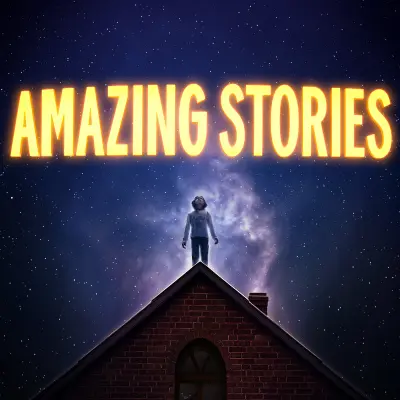Apple TV+'s Amazing Stories reboot feels oddly out of time, like it's picking up where it left off in the 1980s
-

Steven Spielberg's original 1985-1987 NBC version of Amazing Stories attracted a deep roster of talent, including directors like Danny Devito, Peter Hyams, Clint Eastwood, Lesli Linka Glatter, Joe Dante, Robert Zemeckis, even Martin Scorsese. "A murderer’s row of talented writers and actors lined up to fill each episode, making for a memorably impressive cast and crew even on lesser installments," says Alex McLevy. "Spielberg wanted to convey the magical feeling of larger-than-life stories that families could enjoy together, and while it may have been unevenly successful in that regard (despite a good number of Emmy nominations and wins for its first season, ratings plunged, and it was canceled after two years), the show did capture the Amblin spirit of childish wonder that infuses so much of Spielberg’s output with that company. If anything, the new iteration of the series might carry on that tradition and spirit a little too effectively. Judging by 'The Cellar' (the first of five episodes streaming weekly on Fridays on AppleTV+, and the only one made available for review in advance), the show retains the look and feel of the original to such a degree that it feels oddly out of time, like it’s attempting to pick up where it left off without any acknowledgment that 30-plus years have elapsed, let alone ways TV storytelling has evolved in the interim. It’s bright, and earnest, and gently good-natured in a way that suggests TV as forgettable and old-fashioned as a glass of warm milk."
ALSO:
- Amazing Stories excels as a kids show, which is how it should be judged: "In its native US, the show has received much criticism for its lack of flair, innovation and complexity of character," says Lucy Mangan. "Which seems to me to misunderstand the nature of the beast and the audience at which it’s aimed, which is surely not world-weary adult or even young adult viewers, but – just like the original – children. At teatime, ideally, if teatimes are still a thing. To them, basement portals, the bemusement of people landing in the wrong era, beloveds parted across the decades and all the hoary rest of it will be as fresh and exhilarating as it was the first time you came across it, in a Bunty comic strip, or classic time-slip children’s novel (Marianne Dreams? Charlotte Sometimes? Tom’s Midnight Garden?), or one of the Back to the Futures."
- Amazing Stories fails to live up to its title: "Though at first it may feel refreshing to see an anthology show move away from the grim anti-modernism of Black Mirror, the human horrors of the new The Twilight Zone, or the pure supernatural terror of Creepshow, the first episode of Amazing Stories tries so hard to take a brighter and family-friendlier approach to the anthology format it ends up feeling like a watered-down version of better shows," says Rafael Motamayor. "It is one thing that Amazing Stories doesn’t want to dive too deeply into the many, many reasons why no one should want to voluntarily go back to the past and barely glance at the social problems of the time in favor of a basic time-travel love story; it is another thing entirely to talk down to the audience and assume they’d not notice the way the episode skips basic character development or avoids answering any questions about how the world works because they assumed the audience wouldn’t even ask those questions. But hey, at least the original theme song by John Williams is back, and isn’t that great?"
- This reboot feels like a wormhole into that distant past: "Same vibe, same optimism, same shrewd Spielbergian spin that the real soul of America is out there in corn country, where the dark fields of the republic roll on under the night. It's old-fashioned, also atavistic — an all-family viewing option in a world where families haven't actually sat down to watch a show together since 1985," says Verne Gay. "That may be shrewd too, and a play for an untapped market, although logic (or this limited sampling) suggest otherwise."
- Amazing Stories seems to be striving for something to the The Twilight Zone reboot, but at a different pitch
- Amazing Stories feels less amazing in a Black Mirror world
- How much was Steven Spielberg involved?: "We ran our writers room pretty much like any show we’ve run," says executive producer Adam Horowitz. "We would generate ideas, then go sit with Steven and talk about them, and he’d inevitably have incredible thoughts and guidance of his own. It was an incredible collaboration that way. We would then go into the (writers) room and break the stories as we usually do."
- Why producers sought Victoria Pedretti for the opening episode: “We were obsessed with her on Hill House and the benefit of working with Amblin is, ‘Can you get this to Victoria?’ — and they did,” says executive producer Eddy Kitsis, drawing the connection between Spielberg’s Amblin Television producing both Netflix’s Haunting of Hill House and Apple’s Amazing Stories.
TOPICS: Amazing Stories, Apple TV+, Adam Horowitz, Eddy Kitsis, Steven Spielberg, Victoria Pedretti
More Amazing Stories on Primetimer:- Once Dead, TV Anthologies Are Enjoying a New Golden Age
- Apple TV+'s biggest flaw was pursuing big names: Amazing Stories is emblematic of its bland to expendable lineup
- TV anthology series have become lame, lazy and lifeless: Why have they lost their way?
- Amazing Stories shows the flaws with episodic anthology series
